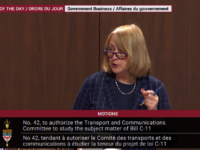Last week, the Standing Committee on Canadian Heritage started its hearings on the Online Streaming Act with the first of four day-long sessions it has planned for witnesses. Morghan Fortier, the co-founder and CEO of Skyship Entertainment, stole the show that day with insights that demand to be heard. Her company may not be a household name, but it is Canada’s leading Youtube streaming service with millions of subscribers worldwide and billions of views. She joins the Law Bytes podcast to talk about her company, the challenges and opportunities for Canadians in online streaming, and her sector’s concerns with the government’s Bill C-11 legislative plans.
Post Tagged with: "canadian heritage"
Is the Government Seeking to Short Circuit the Senate Review of Bill C-11?
The review of the Online Streaming Act (Bill C-11) heads to committee next week as the Standing Committee on Canadian Heritage plans to devote roughly 20 hours to hearing over the next two weeks. I have received an invitation and may appear as soon as next week. While the House of Commons committee study is just getting underway, the Senate has been debating the possibility of conducting a “pre-study” of the bill at its own committee. Pre-studies are somewhat unusual since they are conducted before the bill has formally been referred to the committee or, in the case of the Senate, even passed the House of Commons. In fact, Bill C-10, the predecessor to Bill C-11, started with a pre-study which ultimately undermined the overall committee study that many believed was inadequate.
Digging Into the Government’s Online News Act Claims, Part Two: This is “Minimal Market Intervention”?!
The government has started its defence of Bill C-18, the Online News Act, in the House of Commons with claims that it simply requires compensation for use of news content and adopts a “minimal market intervention” approach. My post yesterday focused on the use claims and this post digs into the bill to see just how minimalist it is. Canadian Heritage Minister Pablo Rodriguez promoted the bill as a market-oriented approach on the day the bill was tabled, leading to an interview with Vassy Kapelos in which she was visibly puzzled at the claim.
Setting aside the fact that many leading Canadian media organizations have already struck news deals with Google and Facebook without government intervention, here is a look at what the government thinks constitutes “minimal market intervention”:
Digging Into the Government’s Online News Act Claims, Part One: Compensation For “Use” of News Content
With the Online Streaming Act having passed second reading in the House of Commons and headed for further study at the Standing Committee on Canadian Heritage, the government moved swiftly to second reading debate on Bill C-18, the Online News Act. I’ve already written several posts expressing concern about the overbreadth of the bill and its implications. The House of Commons debate is just getting underway with the opening defence of the bill delivered by Chris Bittle, the Parliamentary Secretary for Canadian Heritage, presenting a vision of minimal intervention based on fairness:
The compensation that tech giants would provide to Canadian media through Bill C-18 would represent a giant step in ensuring the viability of strong and independent journalism in Canada, which is essential to our democracy. That is what Bill C-18 would do. It is simple. Tech giants would fairly compensate Canadian journalists when they use their content. That is it: no more, no less. It is a market-based solution that involves minimal government intervention, and I think everyone in this place can agree on that.
The government is relying on two claims here: fair compensation for the use of journalist content and a market-based approach with minimal government intervention. While there might indeed be support for a bill that did that, the Bill C-18 reality is far different. The bill extends well beyond compensation for use, stretching the meaning of “use” far beyond a reasonable standard and creating a level of intervention that simply cannot be fairly described as minimalist. This post examines the notion of fair compensation for Canadian journalists when their content is used with a post on “minimal” intervention to follow.
Keeping the Bill C-11 Implementation Secret, Regulating User Content, and Citing Non-Existent Benefits: Some Reflections on the House of Commons Online Streaming Act Debate
The Online Streaming Act (Bill C-11) was the subject of hours of debate yesterday in the House of Commons as the government presses to get the bill out of second reading and onto committee for hearings and further study. Setting aside the claims of “censorship” on one side and “you don’t care about creators” on the other, there were some notable takeaways from the debate, including the government digging in on keeping the policy direction to the CRTC secret, acknowledging (perhaps inadvertently) that the bill does regulate user generated content, and several comments from MPs that promise outcomes that are simply not part of the bill.
Leading off during Question Period was a direct question to Prime Minister Justin Trudeau about releasing the planned policy directive to the CRTC before the bill receives royal assent so that Canadians can see the details of how the bill is intended to be implemented.











